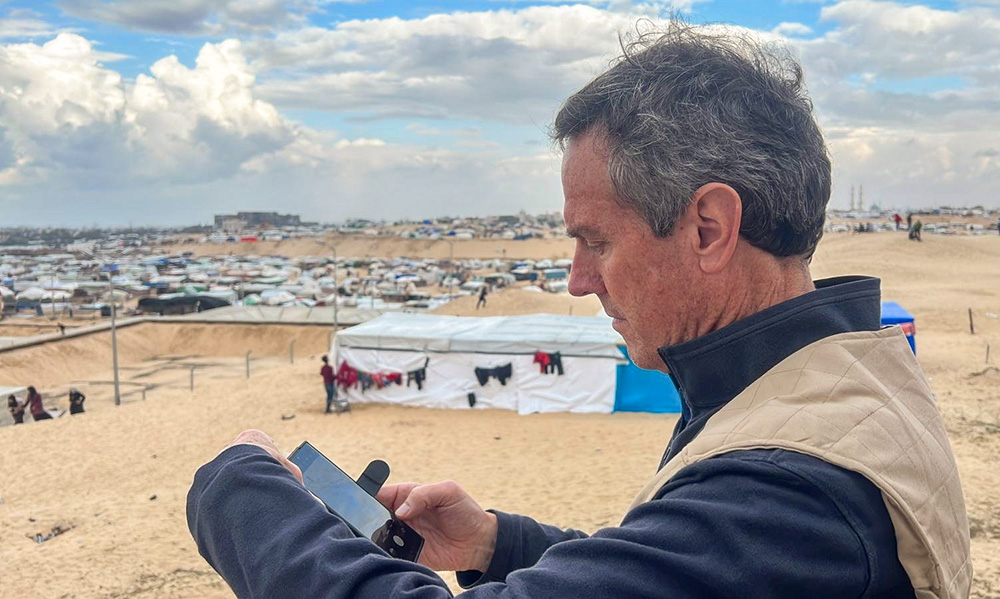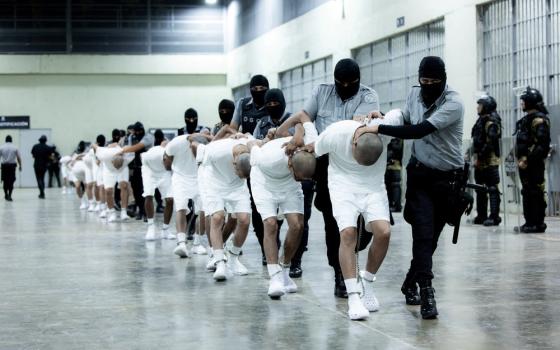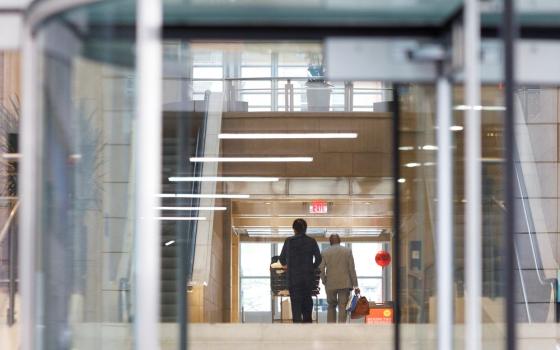
Sean Callahan, president and CEO of Catholic Relief Services, visits southern Gaza Jan. 23, 2024. CRS is bracing for massive cuts because of draconian reductions in U.S. foreign assistance ordered by the Trump administration, according to a Feb. 3, 2025, internal email from Callahan. (OSV News/Courtesy of Catholic Relief Services)
Catholic Relief Services is bracing for massive cuts — as much as 50% this year — because of draconian reductions in U.S. foreign assistance ordered by the Trump administration, according to an internal email from the chief executive of the international relief organization.
CRS is the top recipient of funds from the U.S. Agency for International Development, known as USAID, which the Trump administration has targeted with a spending freeze, office closure and extensive staff cuts this week.
Layoffs have already begun as CRS has been forced to begin shutting down programs funded by USAID, which supplies about half of the Catholic organization's $1.5 billion budget, said CRS president and CEO Sean Callahan in a staffwide email sent Feb. 3.
"We anticipate that we will be a much smaller overall organization by the end of this fiscal year," Callahan wrote in the email, which was reviewed by National Catholic Reporter.
CRS officials at its headquarters in Baltimore did not respond to requests for comment. The U.S. bishops' conference, which created the organization 82 years ago, also did not respond to a request for comment.
Retired Tucson, Arizona, Bishop Gerald Kicanas, a former board chairman of Catholic Relief Services, said eliminating USAID would be a huge mistake. "These are desperate people, living in desperate situations, struggling day by day, hour by hour," Kicanas told NCR.
The cuts would amount to one of the biggest blows ever to CRS, a relief group founded in 1943 by Catholic bishops in the United States to serve World War II survivors in Europe. CRS reaches more than 200 million people in 121 countries on five continents, according to its website.
Callahan said that CRS has already received notifications that some projects for which it is subrecipient have already been terminated and that more are coming.
Advertisement
The staffing cuts and cost-saving measures would be across the board, impacting all divisions and departments of CRS, Callahan said. Temporary furloughs would not be enough to avoid staff cuts, he added.
The cuts will be devastating, said Stephen Colecchi, director of the Office of International Justice and Peace for the U.S. Conference of Catholic Bishops from 2004 to 2018.
"To target this tiny portion of the federal budget in such a haphazard and irresponsible way is going to cost people's lives and livelihoods," Colecchi said. "It is not a thoughtful or humane way to go about treating programs that help the poorest of the poor all over the world."
CRS is holding an emergency briefing Feb. 6 on the foreign aid freeze.
USAID has been an early core target of President Donald Trump's efforts to curtail government spending, led by billionaire Elon Musk who is heading the newly created Department of Government Efficiency, an extragovernmental operation that has been empowered in the administration. Secretary of State Marco Rubio said he is now running USAID. While independently created by Congress, it is a part of the State Department.
Democrats in Congress have challenged the legality of the attempts to slash USAID funding or shutter the office entirely.
Compared to other federal departments, USAID's share of the budget is a sliver. In fiscal year 2023, the U.S. allocated $916 billion for defense, or 3.4% of gross domestic product. The Defense Department requested $849.8 billion for fiscal year 2025.
"If you want to review a program, you don't simply freeze it in place, especially when local people are relying on it for lifesaving and life-changing programs," Colecchi said. "What you do is a systematic review for effectiveness and then you decide which programs are to continue and which programs are to sunset.
"A blanket freeze, even for a short period of time, means staff will have to be let go, programs will get interrupted and supply chains will be disrupted," Colecchi added.
"It will really tarnish the reputation of our nation, which has always had a good reputation in the area of humanitarian assistance."
Over a nine-year period — from the 2013 to 2022 fiscal years — Catholic Relief Services received $4.6 billion in funding from USAID, primarily for disaster assistance, according to an August 2024 report by the Congressional Research Service, a branch of the Library of Congress.
Church and faith-based organizations received less than 6% of USAID funding for nonprofit organizations, with more than half of those funds going to Catholic Relief Services, according to the Congressional Research Service.
Among the programs and services provided by CRS: water and sanitation, education, agriculture, health, microfinancing, climate change resilience, as well as justice and peace-building programs in addition to emergency and disaster assistance.
"CRS is the Gospel at work and reflects the best of American values," John Carr, former executive director of the U.S. Conference of Catholic Bishops' Department of Justice, Peace and Human Development, told NCR.
CRS had 7,000 employees worldwide as of 2018 when it marked its 75th anniversary.
Kicanas, CRS board chairman from 2010 to 2013, said that CRS is trusted around the world. Pulling back programs that support starving and suffering people will have serious ramifications.
"So it's not like a short freeze won't be insignificant," Kicanas said. "It will be very significant for countless numbers of people in countries around the world."
Kicanas said the Trump administration may not "understand the unintended consequences of what a freeze will do, and the impact it will have."







